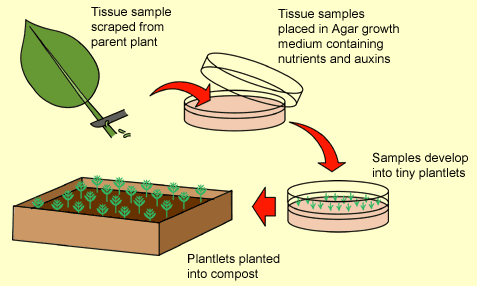all you need to know about
CLONING

PLANT
CLONING
Plant cloning is very popular nowadays. This is because plant
clonings have lots of important commercial implications. The reason is because it allows a
large variety of plants to be produced
commercially and cheaply. This is acheieved in a short space of time. In other words, we
clone plants to fulfill our daily needs. So, how are we going to clone plants? There are
two popular
ways namely cuttings and tissue culture.
CUTTINGS
-Cuttings can be considered as the easiest and cheapest way for us to clone plants.
-The process:
i) Cut off a branch from a parent plane
ii) Remove the lower leaves
iii) Plant the stem in a damp compost
iv) To encourage new roots to develop, we usually use plant hormones.
v) We must keep the cutting mois and warm so we covered it in a plastic bag.
vi) After a few weeks, the new roots will develope and a new plant is produced..
TISSUE CULTURE
- Cloning using tissue culture method is much more harder compare to cuttings.
This is because we need to sterile agar jelly with plant hormones and we need a large
number of nutrients.
As a result of this, tissue culture is more expensive than cuttings.gs.

There are a few steps that we must follow in the tissue culture
method.
i) We take a small amount of parent tissue.
ii) Transfer the plant material(tissue) on plates containing sterile nutrient agar
jelly.
iii) To make the cells divide, we must use plant hormones.
iv) This will cause the cell growth rapidly.
v) Tissues are formed.( small mass)
vi) We add more growth hormones to stimulate growth of roots and stem.
vii) Next the tiny plantlets will be transferred into potting trays. They will become
plants.








This website is best view
using Microsoft Internet Explorer 6.0 and above and Mozilla Firefox and resolution 1024 x
768.
The contents of this website are copyright (C) of
Cham Wei Lun and Wong Jun Wei. Any problems or query, please email to
cloning_scb@yahoo.com.my
